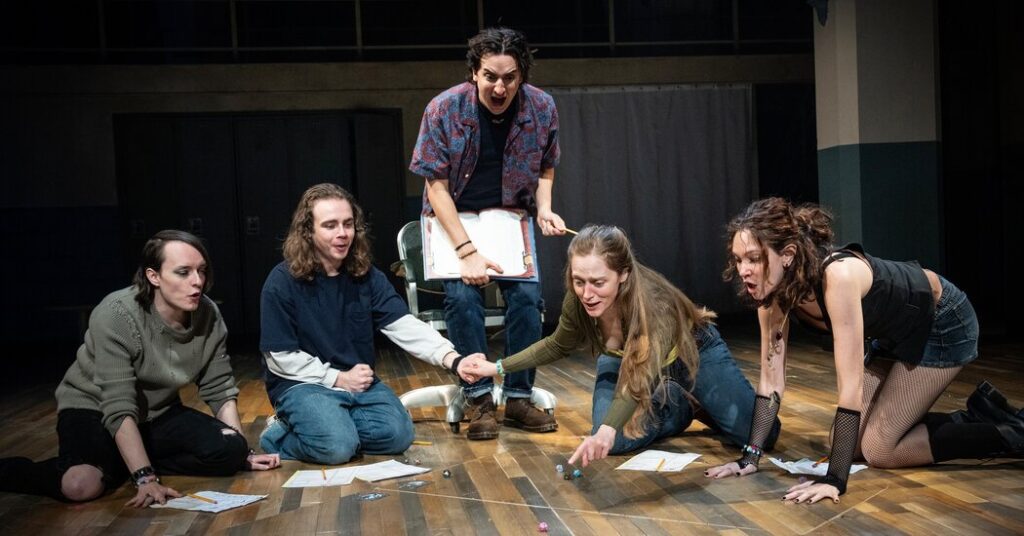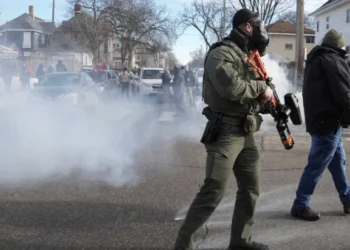Else Went developed several scripts over four years as part of the Public Theater’s emerging writers group and then two while on staff as a resident writer. Now, at 35, she is making her Off Broadway debut with “Initiative,” about seven small-town California high schoolers coming-of-age in the early aughts.
For this premiere, New York audiences are being asked to do something they rarely do these days: commit five hours to watching a play. Went insists it’s not too much of a request. Commitment, she said, “doesn’t have to be an intense act.”
“It can be a softening, a relinquishing of concerns,” she added.
“You’re here for a significant experience in terms of time, but also in terms of how I want you to be able to listen and sink in.”
It says a lot, then, that the institution producing this sweeping story by Went and her wife and collaborator, the director Emma Rosa Went, is the Public Theater, the nonprofit incubator of the acclaimed works like “Topdog/Underdog” and “Hamilton.”
“I believe that this is the definitive play of a generation,” said Amrita Ramanan, who directs the Public’s new work development program. She said she was moved by Went’s writing, which spoke to the experiences of her team of millennial staffers who attended high school in the early 2000s.
In “Initiative,” those experiences include bonding over the role-playing game Dungeons & Dragons and collectively dreaming of escaping a “coastal podunk” town. But weightier matters abound. One character, Lo, tries to shield his younger brother from their mother’s addiction. Another, Riley, comes out to Clara, a former elementary school bestie, but they soon find themselves in dark places after a rift in their friendship.
The show also depicts teenage intimacy: It opens with an oral sex scene between two eighth graders. There are also moments of nudity and depictions of sexual harassment. The play “does a lot of daring things,” said Went, who wanted audiences to think critically about the complicated dynamics of early sexual relationships and reflect on their own early sex lives.
While recent dramas like “John Proctor Is the Villain,” “All Nighter” and “Trophy Boys” have featured 20-somethings passing, believably, as high school and college students, the cast of “Initiative” skews older. Carson Higgins, who plays Lo, is 37. Greg Cuellar (Riley) is 35, and Olivia Rose Barresi (Clara) is 34.
Emma Rosa Went, 35, said that was by design: “The characters are all millennials and the actors are all millennials.” In drawing on their own memories, she added, “they’re doing a kind of time travel.”
The director says casting these actors felt essential. Though some newcomers are playing offstage voices and understudies, the central cast members have helped develop the play through years of workshops. Now, they are all making their Public Theater debuts. Cuellar appreciates the creative team’s loyalty. “We have all worked so hard and scrapped for so long under the radar,” he said.
Emma Rosa Went remembered her first time working with Cuellar, during a 2018 development session at the Playwrights Realm. Else Went was struggling to write an argument between Riley and Clara. From the jump, the director said, Cuellar seemed to understand his character’s psychology. “I remember Greg saying, ‘I know,’ and explaining it back to us, like, ‘He’s jealous of her because of this and this and this,’” she said. “Those things bled directly into the dramaturgy.”
While the cast has helped to fine-tune “Initiative,” the show has also changed them. Barresi, who plays the overachiever Clara, has been with “Initiative” since its first formal reading in 2016. When Clara joins the Dungeons & Dragons group in the show, it gives her an identity beyond her academic success. Barresi, who had never played the game before, has now been part of several groups, and recalled how one lengthy campaign helped her get through the pandemic. “We all needed so badly to just imagine ourselves in other places,” she said.
Higgins, whose character gets swept up in sports, sex and drugs, said: “I wonder who the hell I would be if I never got involved with this play. I feel much, much more connected to my younger self, to my present self, and like I’m building a more sturdy future self.”
Else Went finished the first draft in 2016, but she can trace the concept to an undergraduate playwriting class she took at Sarah Lawrence in 2011. Her professor, the playwright Lucy Thurber, asked students to write a scene about kindness or generosity. Went, who had recently started playing Dungeons & Dragons one-shots, wrote about a gameplay session interrupted by news of a horrible tragedy, and how the game became a safe place for the players to process. That scene isn’t in “Initiative,” but Went wanted the play to have a sense of the game being a place where teenagers could find solace in community when the world around them becomes hard to understand.
The play’s setting has been with her even longer. Went grew up in Cambria, a village two and a half hours north of Santa Barbara that she described as “the place on the California coast with the least light pollution.” (That’s also where she met Emma Rosa Went — who has directed every iteration of “Initiative” — after their junior year of high school.) It’s no coincidence that “Initiative” takes place in a town like Cambria — or that it centers on a small public school much like the one Else attended.
As for the long run time, Emma Rosa Went acknowledged that attention spans are shrinking. Even prepandemic, she felt that new plays followed a pattern: “Everything has to be a tight 100 minutes or less, and everything has to be really patly political and digestible.” Still, she wondered if the tide was turning, citing “Stereophonic” and “Public Obscenities,” which ran about three hours, as “some of the most artistically successful new plays of the last few years.”
The Wents hope “Initiative” is just as successful.
Else Went views the play as “a love letter to English class.”
But Cuellar was more direct: “This is a play about survival. But I also think it is a play about fate, and I think it is a play that reminds us that some people do not make it.”
At one point, Cuellar’s Riley, a writer, vents about his work being “garbage.” “But nobody’s told me yet, so it’s like that science cat that’s dead and alive at the same time.”
Else Went said her own ambitions and insecurities helped inspire Riley’s journey. But Went isn’t worried about what will happen when audiences open the box. “I’m finding it harder and harder to connect with that feeling,” she said. “I’m not terrified anymore.”
The post In This Show, Four Years of High School Unfold Over Five Hours appeared first on New York Times.




